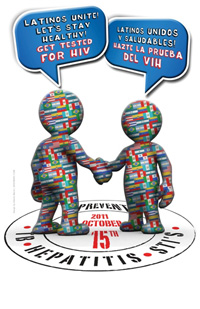National Latino AIDS Awareness Day
 October 15 was National Latino AIDS Awareness Day (NLAAD). Latinos are encouraged to support HIV testing and prevention education, which saves lives. The theme is "Latinos Unite! Let's Stay Healthy! Get Tested for HIV!"
October 15 was National Latino AIDS Awareness Day (NLAAD). Latinos are encouraged to support HIV testing and prevention education, which saves lives. The theme is "Latinos Unite! Let's Stay Healthy! Get Tested for HIV!"
HIV and Hispanics/Latinos
 The HIV epidemic continues to be a serious threat to the Latino community. While Latinos represent approximately 16% of the U.S. population, they accounted for 20% of new HIV infections in 2009, the latest year for which data is available. Additionally, at some point in their lives, approximately 1 in 36 Latino men will be diagnosed with HIV, as will 1 in 106 Hispanic women. In fact, the rate of new HIV infections among Latino men is almost three times that of white men, and the rate among Latinas is more than four times that of white women.
The HIV epidemic continues to be a serious threat to the Latino community. While Latinos represent approximately 16% of the U.S. population, they accounted for 20% of new HIV infections in 2009, the latest year for which data is available. Additionally, at some point in their lives, approximately 1 in 36 Latino men will be diagnosed with HIV, as will 1 in 106 Hispanic women. In fact, the rate of new HIV infections among Latino men is almost three times that of white men, and the rate among Latinas is more than four times that of white women.
The impact of HIV on Latino communities is not directly related to race or ethnicity, but rather to some of the barriers faced by many Latinos including poverty (being poor), migration, stigma, and acculturation (the process of adopting the cultural traits or social patterns of another group).
The National HIV/AIDS Strategy [PDF - 1.2MB] calls for prioritizing prevention efforts in the populations where HIV is most heavily concentrated and for alleviating racial and ethnic disparities, like those documented among Latinos. To achieve the strategy's goals, CDC is implementing "High-Impact Prevention [PDF - 258KB]," a new approach designed to maximize available HIV prevention resources and have the greatest impact on the U.S. HIV epidemic.
National Latino AIDS Awareness Day
 Latino communities, with assistance from federal, state and local public health agencies, have increased efforts to address the effects of the epidemic. Initiated in 2003 by the Latino Commission on AIDS and the Hispanic Federation in partnership with faith and community organizations, NLAAD raises awareness of issues concerning HIV/AIDS within the Latino population living in the United States and abroad.
Latino communities, with assistance from federal, state and local public health agencies, have increased efforts to address the effects of the epidemic. Initiated in 2003 by the Latino Commission on AIDS and the Hispanic Federation in partnership with faith and community organizations, NLAAD raises awareness of issues concerning HIV/AIDS within the Latino population living in the United States and abroad.
This year's theme—Latinos Unite! Let's Stay Healthy! Get Tested for HIV!—speaks to the critical role Latino community members play in supporting HIV testing and prevention education, which saves lives. We can promote healthy communities by facilitating partnerships; hosting community events that encourage people to seek HIV testing, counseling, and treatment; and by developing and disseminating prevention strategies that are culturally competent and accessible.
The Centers for Disease Control and Prevention (CDC) recommends that all adolescents and adults be tested for HIV as a routine part of medical care – regardless of perceived risk. Yet more than a half of Latinos have never been tested. It's critical to know your HIV status so you can take steps to protect yourself and sexual partner(s).
What Latino Communities Can Do
Individuals can
 Get tested to find out if they are HIV positive.
Get tested to find out if they are HIV positive.- Seek early medical care if they have HIV to protect their own and their partners' health.
- Protect themselves and others from HIV through safer sex practices, not using or injecting drugs, and not sharing needles if they inject drugs.
- Educate themselves and others about HIV.
- Get involved in their communities to help prevent HIV or provide services to those in need.
Organizations are encouraged to
- Promote NLAAD within their organizations and their broader community. Organizations and agencies are getting involved in support of NLAAD across the nation. HIV awareness and testing events will provide thousands of Hispanics/Latinos with the important information they need to protect their health, their loved ones, and to get involved.
- Encourage employees to get involved in NLAAD activities.
- Educate staff about HIV/AIDS.
- Develop HIV/AIDS policies for the workplace.
More Information
- National Latino AIDS Awareness Day 2011
- Basic Information about HIV and AIDS (English) Información básica sobre el VIH y el SIDA (En Español)
Learn about HIV/AIDS, how it is and is not transmitted, the risk factors for HIV transmission, preventing transmission, and the symptoms of HIV infection. - HIV in the United States: An Overview (English)
- National HIV and STD Testing Resources (English) Recursos nacionales para las pruebas del VIH y ETS (En Español)
Find an HIV test site near you from the National HIV Testing Database, a CDC-sponsored service available 24 hours a day. - Latino Commission on AIDS (English) Comisión Latina sobre el SIDA (En Español)
The Latino Commission on AIDS is a nonprofit membership organization dedicated to fighting the spread of HIV/AIDS in the Latino community. - Act Against AIDS (English)
CDC works 24/7 saving lives and protecting people from health threats to have a more secure nation. A US federal agency, CDC helps make the healthy choice the easy choice by putting science and prevention into action. CDC works to help people live longer, healthier and more productive lives.
Get email updates
To receive email updates about this page, enter your email address:
Contact Us:
- Centers for Disease Control and Prevention
1600 Clifton Rd
Atlanta, GA 30333 - 800-CDC-INFO
(800-232-4636)
TTY: (888) 232-6348 - cdcinfo@cdc.gov



